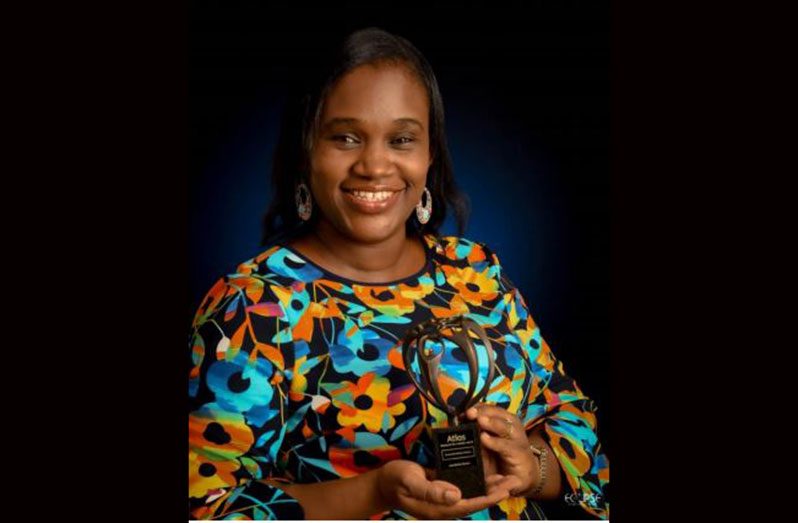— for academic work documenting changes in education due to COVID-19
‘SUDDEN change of pedagogy in education driven by COVID-19 Perspectives and evaluation from a developing country’ is the academic treatise which earned UG lecturer, Temitayo Deborah Oyedotun, the nod ahead of 1,000 others to win the prestigious Atlas award this year.
Temitayo Deborah Oyedtun is a lecturer at the Department of Curriculum and Instruction, Faculty of Education and Humanities, University of Guyana. She is the second person in the South America continent, and the first in Guyana, to have won the award since its inception in 2015. Oyedotun’s article was published in the journal Research in Globalisation https://www.journals.elsevier.com/research-in-globalization/news/article-granted-theatlas-award and was selected from thousands of published articles to be awarded the prize.
Each month, 10 articles are selected from published research across Elsevier’s 3,800 journals by an external advisory board out of which one is selected as research that can impact or has significantly impacted people’s lives around the world.
She said: “I am happy to have been considered for this award. I only thought of documenting what I observed, and I am happy that most of what I wrote as challenges when we were migrating online have been addressed by the university. I hope that our experience as documented and recognised would serve as a guide to other developing countries. I thank Mr Alim Hosein, Ms Elsa Cromarty and Mr Mark McGowan for their reviews, comments and suggestions when the paper was initially prepared and submitted as an opinion paper.”
In December 2020, Oyedotun’s article was nominated among the 10 shortlisted and was subsequently selected winner. An External Advisory Board, made up of individuals from international NGOs, selects a single Atlas article around one of the UN SDG themes from published research from Elsevier’s 3,800 journals hosted at ScienceDirect. The panelists review the contribution to science and society, and analyse the societal impacts of the article. Oyedotun’s article was selected around the Sustainable Developmental Goal 4, Quality Education. The External Advisory Board includes, among many others, the Ban Ki-Moon Center for Global Citizens, Bioversity International, Epicentre (MSF), Health & Global Policy Institute, International Training and Outreach Center in Africa (ITOCA), University of California, Berkeley (Center for Effective Global Action) and United Nations Environmental Programme (UNEP).
WIDE READERSHIP
ATLAS articles showcase research that can (or already have) significantly impact(ed) people’s lives around the world and Elsevier hopes that bringing wider attention to this research will go some way to wider dissemination, ensuring its successful implementation. Articles are hosted prominently on Elsevier.com which is visited by almost three million people each month and Oyedotun’s article has been made freely available on ScienceDirect https://www.sciencedirect.com/science/article/pii/S2590051X20300186 to ensure it is accessible to all.
While congratulating Oyedotun and thanking her for her contribution to education, V. Prade López, Associate Publisher, Atlas Programme Manager, has indicated that Elsevier would be delighted to hold a virtual ceremony of the award in the near future instead of the usual in person ceremony because of COVID-19 restrictions.
The trophy has already been posted (February 2021) to the staff. While the article was selected as an Atlas article for December 2020, Elsevier also commissioned a journalist to interview the author and explain the article for wider audiences. The interview of Oyedotun by Lucy Goodchild van Hilten that was recently conducted would be published in Elsevier Atlas soon.
This is a great achievement, not only for Temitayo Oyedotun but also for the Faculty of Education and Humanities, the University of Guyana and the leadership of the university who proactively took some radical actions that ensured the successful transition from traditional teaching to virtual classroom engagement suddenly.
Oyedotun’s article documented the sudden change, the actions that were taken by the university, the challenges of the change as well as the benefits derived from transition. The University of Guyana’s Vice-Chancellor and senior administration have extended congratulations and have encouraged the continued excellence in academic writing amongst its faculty. The university moved all its courses and systems online from April 2020 as a result of COVID-19 in order to keep operating in a safe mode. Since then, it has built out its online learning platform, policies and online service teams to offer over 1,000 of its courses virtually. (University of Guyana Publicity and Communication Unit)




.png)









